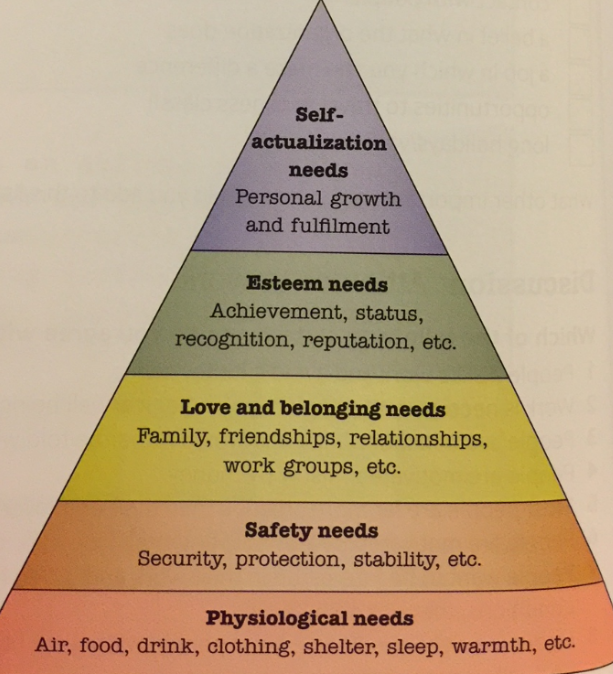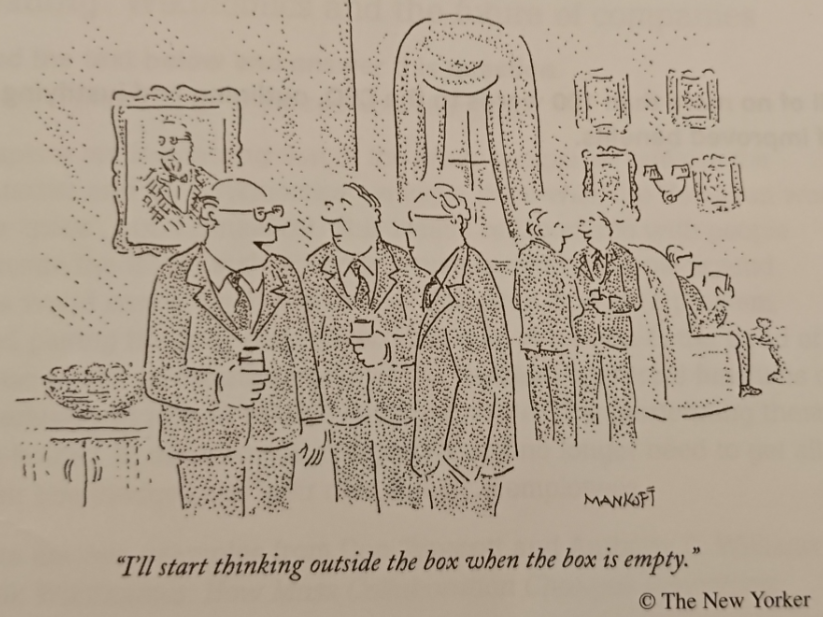Aims
- Discuss the importance of motivation
- Compare and then summarize various theories of motivation
- Consider the best way to motivate people in specific situations
Lead-in
One of the most important responsibilities of a manager is to motivate the people who report to him/her. But how? What kind of things motivate you? Which of these motivators would be important for you in your choice of a job? Classify them in order of importance.
□ good remuneration (salary, commission, bonuses, perks)
remuneration [rɪmjùːnəréɪʃən] : 報酬 commission[kəmíʃən]:委任、委任された仕事 perks:複数形で (職務に付随する俸給以外の)臨時収入
□ good working relations with your line manager and colleagues
□ good working conditions (a large, light, quiet office; efficient secretaries)
□ job security
□ the possibility of promotion
□ a challengin job
□ responsibility
□ contact with people
□ a belief in what the organization does
□ a job in which you can make a difference
□ opportunities to travel (business class!)
□ long holidays/ vacations
What other important motivators would you add to this list ?
Discussion : Attitudes to work
Which of the following statements do you agree with ?
- People dislike work and avoid it if they can.
- Work is necessary to people’s psychological well-being.
- People avoid responsibility and would rather be told what to do.
- People are motivated mainly by money.
- Most people are far more creative than their employers realize.
- People are motivated by fear of losing their job.
- People want to be interested in their work and, given the right conditions, they will enjoy it.
- Under the right conditions, most people will accept responsibility and will want to realize their own potential.
Reading: Theory X and Theory Y
The statements on the previous page can be separated into two groups reflecting two very different ways in which employers can treat their employees. Douglas McGregor, an American expert on the psychology of work, summarized these two approaches and named them Theory X and Theory Y. Read the text below and classify the statements according to which theory they support.
| Statement | 1 | 2 | 3 | 4 | 5 | 6 | 7 | 8 |
| Theory | X | Y | X | X | Y | X | Y | Y |
In The Human side of Enterprise, Douglas McGregor outlined two opposing theories of work and motivation. What he calls Theory X is the rather pessimistic approach to workers and working which assumes that people are lazy and will avoid work and responsibility if they can.Consequently, workers have to be closely supervised and controlled, and told what to do. They have to be both threatened, for example with losing their job, and rewarded with incentives, probably monetary ones such as a pay rise or bonuses. Theory X assumes that most people are incapable of taking responsibility for themselves and have to be looked after. It has traditionally been applied, for example, by managers of factory workers in large-scale manufacturing.
Theory Y, on the contrary, assumes that most people have a psychological needs to work, and given the right conditions – job security, financial rewards – they will be creative, anbitious and self-motivated by the satisfaction of doing a good job. Theory Y is probably more applicable to skilled professionals and what Peter Drucker called ‘knowledge workers’ – managers, specialists, programmers, scientists, engineers – than people in unskilled jobs.
McGregor’s two theories are based on Abraham Maslow’s famous ‘hierarchy of needs’. Theory X relates to the basic, ‘lower order’ needs at the bottom of the hierarchy, such as financial security, while Theory Y relates to ‘higher order’ needs such as esteem (achievement, status and responsibility) and self-actualization (personal growth and fulfilment) that can be pursued if basic needs are satisfied
McGregor is widely considered to have laid the foundations for the modern people-centred view of management. However, Maslow spent a year studying a Californian company that used Theory Y, and concluded that there are many people who are not looking for responsibility and achievement at work. There will always be people with little self–discipline, who need security and certainty and protection against the burden of responsibility, so it is impossible to simply replace the ‘authoritarian’ Theory X with the ‘progressive’ Theory Y.

Comprehension
Read the text again and answer these questions.
- According to Theory X, why do employees have to be closely controlled?
- According to Theory Y, why should employers give their workers responsibilities?
- Why did Maslow criticize Theory Y?
Writing
Now write a summary of Theories X and Y, using no more than 50 words for each.
Discussion
- In your working experience, even if it is only weekend or temporary summer holiday jobs, have your supervisors seemed to believe in Theory X or Theory Y?
- What would you do to try to motivate subordinates who did not want to take responsibilities at work, and who had uninterestring, repetitive jobs?
Reading: ‘Satisfiers’ and ‘motivators’
Another well-known theorist of the psychology of work, Frederick Herzberg, has arged that good working conditions are not sufficient to motivate people. Read the text and find out why.
It is logical to suppose that things like good labour relations, good working conditions, job security, good wages, and benefits such as sick pay, paid holidays and a pension are incentives that motivate workers. But in The Motivation to Work, Frederick Herzberg argued that such conditions – or ‘hygiene factors’ – do not in fact motivate workers. They are merely ‘satisfiers’ – or , more importantly, ‘dissatisfiers’ where they do not exist. Workers who have them take them for granted. As Herzberg put it, ‘A reward once given becomes a right.’ ‘Motivators’, on the contrary, include things such as having a challenging and interesting job, recognition and responsibility, promotion, and so on. Unless people are motivated, and want to do a good job, they will not perform well.
***next time ***
However, there are and always will be plenty of boring, repetitive and mechanical jobs, and lots of unskilled workers who have to do them. How can managers motivate people in such jobs? One solution is to give them some responsibilities, not as individuals but as part of a team. For example, some supermarkets combine office staff, the people who fill the shelves, and the people who work on the checkout tills into a team and let them decide what product lines to stock, how to display them, and so on. Other employers encourage job rotation, as doing four differrent repetitive jobs a day is better than doing only one. Many people now talk about the importance of a company’s shared values or corporate culture, with which all the staff can identify: for example being the best hotel chain, or hamburger restaurant chain, or airline, or making the best, safest, most user-friendly, most ecological or most reliable products in a particular field. Unfortunately, not all the competing companies in an inductry can seriously claim to be the best.
Comprehension
Are these sentences true or false?
Herzberg argued that ‘hygiene factors’ motivate workers.
Challenging jobs and responsibility are hygiene factors.
Some unskilled jobs will always be boring and repetitive.
Workers might be motivated by having responsibilities as part of a team.
Job rotation can make a day’s work more interesting.
You can always motivate workers by telling them that they work for the best company in the field.
Vocabulary
Find the words in the next that mean the following.
- interactions between employers and employees, or managers and workers.
- knowing that there is little risk of losing one’s employment.
- money paid (per hour or day or week) to manual workers
- advantages that come with a job, apart from pay
- things that encourage poeple to do something
- to be raised to a higher rank or better job
- without any particular abilities acquired by training
- regularly switching between different tasks
- a company’s shared attitudes, beliefs, practices and work relationships.
Discussion
How convinced are you by Herzberg’s theory of satisfiers and motivators ?
motivator : 動機、satisfiers : A person who, or thing that satisfies.
Listening 1 : Managers and motivation
Listen to three MBA students at the Judge Business School talking about motivation, and answer these questions.
 |
 |
 |
- According to Krishna, what is the disadvantage of working in auditing compared to banking?
- How did Krishna’s company retain its staff?
- According to Carlo, what is the main reason why people leave their job?
- According to Carlo, does a company need a set of motivational incentives?
- What does Carlo say a manager needs to do to engage his/her team?
- According to Saktiandi, do the staff have to do what the organization wants, or vice versa?
- What does Saktiandi say about the importance of influencing and convincing people?
Discussion
- Would you stay in a job for the reason Krishna suggests?
- Would you leave (or have you left) a company for the reason that Cario says is the most common?
- Would working for a manager who has influence within the organization motivate you?
Listening 2 : Out-of0work activities
Listen to Janine George, another MBA student at Camgridge, talking about motivation, and answer these questions.

- How long had some of Janine’s operational team been working in their jobs?
- What kind of company is Janine talking about?
- How long are the working days?
- How did she find the workers when she arrived at the company?
- What did she do to rectify the situation?
- What did she find out at the meetings?
- What examples does she give of out-of-work activities that the company was able to draw on to motivate staff?
- What was the lesson of this experience for Janine?
- Janine talks about activities that are not ‘related to the bottom line’. What does this mean?
- Janine says managers should ‘think outside of the box’. What does she mean by this and why do you think she apologizes for using this expression?

Case study : A car manufacturer
The senior managers of a car manufacturer sense and increasing level of dissatisfaction among most of the different categories of staff. The company has the following groups of employees, with different benefits:
- senior management (high salaries, free company cars, company restaurant, 25 days annual holiday)
- designers (high salaries, free company cars, company canteen, 20 days holiday)
- production-line workers (fixed salary, company canteen, 20 days holiday)
- secretarial and administrative staff (salary according to experience, company canteen, 20 days holiday)
- sales representatives (low fixed salary plus commission on sales, 20 days holiday)
- canteen and restaurant staff (20 days holiday, free meals in canteen)
- clreaners (hourly wages, plus 8.33% extra as holiday pay, no other benefits)
The managers meet to consider ways of increasing staff motivation. They have to decide whether any of the following suggestions would be appropriate for different groups of employees:
- building sports facilities (e.g. a gymnasium, tennis courts)
- establishing a profit-sharing programme
- giving longer paid holidays (such as an extra day for every year worked over ten years)
- offering cars at discount prices
- offering career training
- offering early retirement
- paying a higher salary
- paying productivity bonuses
- reducting the working week (e.g. to 35 hours)
- setting up a creche for employees’ pre-school-age children
- spending some money on decorating the organization’s premises (e.g. with plants, pictures)
- subsidizing the staff canteen
In small groups, decide whether to implement any of these suggestions.
Writing
Write an email of no more than 100 words to the CEO, outlining and justifying your choice of improved benefits.
I studied :
pessimistic [pèsəmístɪk] : 悲観的な
Consequently [kάnsɪkwèntli] : as the result of .. その結果として
on the cóntrary [今述べられたことに強く反対して] それどころか, とんでもない.
hierarchy hάɪ(ə)rὰɚki (官庁などのピラミッド形の)階級組織,階層制度.
pursue pɚsúː 〈計画・調査・研究などを〉遂行する; 従事する; 続行する.
self‐discipline : 自己訓練
burden [bˈɚːdn] :重荷、負担